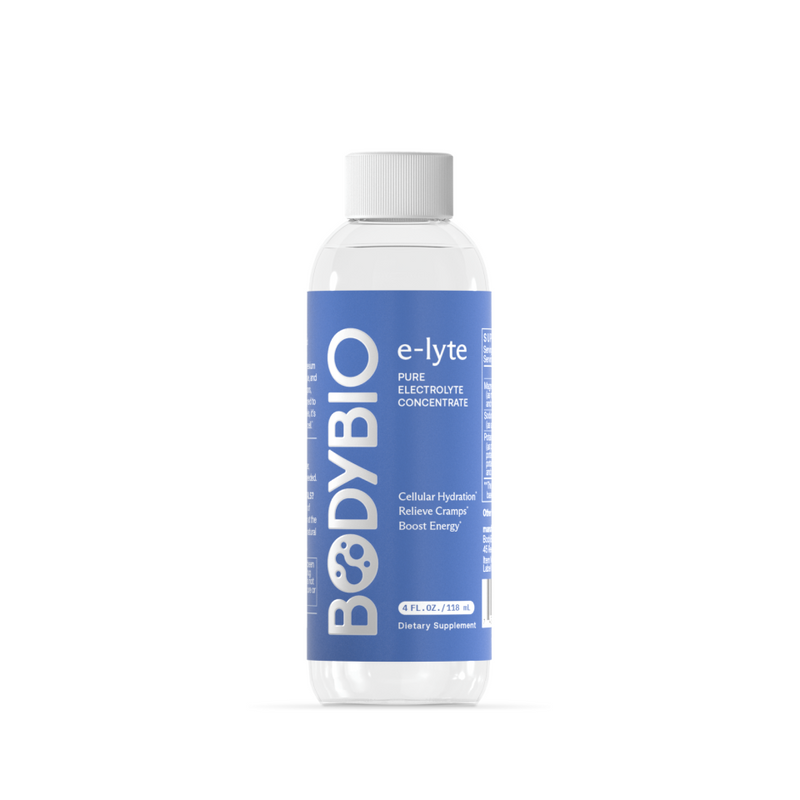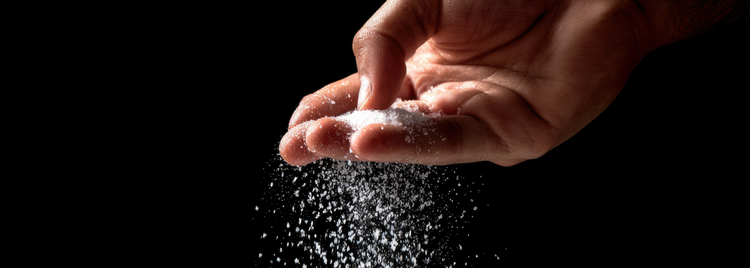Dehydration from Alcohol: How to Bounce Back from a Hangover (Or Prevent One)
Authors:

Dr. Thomas Wnorowski
PhD, CNCC Research Director, BodyBio & Biomedical Nutritionist
Key Takeaways:
Key Points:
- Dehydration from alcohol isn’t uncommon. Because alcohol inhibits antidiuretic hormone, it can force liquids out of your body — along with essential minerals and electrolytes.
- Symptoms of dehydration include things like dizziness, fatigue, dry mouth, puffy ankles, body aches, dark urine, and extreme thirst. If you’re good at listening to your body, you can usually tell when dehydration from alcohol starts to impact you and stop the symptoms in their tracks.
- There are several ways to prevent dehydration from alcohol and stop the symptoms once they start. Try supplementing with minerals and electrolytes, eating a nutrient-dense meal or snack, and doing some exercise.
Rum balls and spiked cider? How about a bit of bubbly? Yes, please.
If you’re consuming more alcohol during the holiday season, you’re not alone. Social drinking is just part of the holiday package — and homemade cocktails, wine, and champagne all deserve a spot in your celebrations. Yum.
When you’re drinking more than usual, it’s important to remember to consume alcohol responsibly (for both your health and safety!). Alcohol is a diuretic, which means it moves fluid out of your body and can easily dehydrate you. Not only is staying well-hydrated key to your long-term health, but it can also help you avoid uncomfortable hangover symptoms.
After all, waking up on Christmas morning with screaming kids and a raging hangover is the opposite of holiday cheer.
Let’s talk about dehydration from alcohol — why it happens, how to avoid it, and the immediate remedies you can use to avoid a hangover.
Table of Contents:
- Why Does Alcohol Dehydrate You?
- How to Prevent Dehydration from Alcohol
- What to Do If You’re Already Dehydrated from Alcohol
- Hydration Supplements to Combat Alcohol Dehydration
Why Does Alcohol Dehydrate You?
We’re sure you’ve noticed that alcohol consumption makes you pee. Alcohol is a natural diuretic that draws fluid out of your body, expelling it through your kidneys and bladder more rapidly than usual. It does this by inhibiting your antidiuretic hormone — a hormone that’s used by the body to protect against dehydration. This hormone encourages your body to collect concentrated fluid in the kidneys and bladder, before peeing it out.
With impaired antidiuretic hormone, you’ll notice more trips to the bathroom and less concentrated urine. Essentially, expelling much-needed fluids that your body wouldn’t normally waste.
How to Prevent Dehydration from Alcohol
First, you should know what the symptoms of dehydration from alcohol look like. Here are some you might experience:
- Headache
- Puffy ankles
- Dizziness
- Body aches
- Digestive issues
- Fatigue
- Hindered workout performance
- Muscle weakness
- Dark urine
- Extreme thirst
Luckily, it’s easy to prevent these symptoms with a few lifestyle changes.
1. Know Your Alcohol Tolerance
Knowing and listening to your own body is the best way to prevent a hydration mishap — or really, any medical mishap. Just because your friends are taking that extra tequila shot doesn’t mean you have to.
When consuming alcohol, consider your health history. Do you regularly get dehydrated from alcohol, sports, and high altitude? Make a plan. Consider how you’d like to feel later in the evening, or the next morning, and choose ahead of time how much alcohol you should consume. Some of us are more resilient to the effects of alcohol than others, but we should all know our limits.
Especially during the holidays, the boundaries you make with alcohol can safeguard your time with close family and friends — allowing you to be your most present self on Christmas morning, instead of nursing a hangover.
2. Drink Responsibly At Altitude
A bottle of whiskey on the mountain after a full day of skiing and snowboarding sounds like a dream. If you’re drinking at altitude (and you’re not used to it!) remember that dehydration is a much bigger concern. Above 5,000 feet elevation, your body can lose fluids almost twice as fast as it can at sea level.
This is due to the lack of oxygen. Your organs have to work extra hard in an environment with less air, and your respiratory system uses more water.
In high-altitude areas, people tend to get drunk faster, too. There’s less air pressure, so alcohol enters your bloodstream even more rapidly. If you’re drinking at altitude, you should probably start out with less alcohol than usual. Remember to listen to your body, prep with hydration minerals (aka electrolytes), and never drink on an empty stomach.
3. Check the Alcohol Content
A spiked cider for the holidays probably won’t do too much to dehydrate you — but it could be a completely different story with hard liquor like whiskey, brandy, and vodka. Make sure you’re aware of the alcohol content in your drinks. Some can be tricky — like high-quality wines with a higher alcohol by volume than low-quality wines.
Additionally, dark liquors especially have high contents of congeners and tannins, which studies have shown to increase hangover symptoms (including dehydration).
4. Never Drink On An Empty Stomach
Drinking on an empty stomach is never recommended. Since the alcohol content reaches your bloodstream faster, you might find yourself bringing up politics with Aunt Janet just two drinks in. Whew, that’s not how you meant to start the Thanksgiving festivities.
Dehydration is also more of a risk on an empty stomach. Because alcohol inhibits antidiuretic hormone, it can force liquids out of your body along with essential minerals and electrolytes – this process occurs even faster on an empty stomach.
Drinking after a nutrient-dense meal of healthy carbohydrates, protein, fiber, and fats provides more of a “slow release” effect. Because the antidiuretic effects kick in more slowly, you are less likely to experience dehydration.
5. Hydrate with Minerals Regularly
Most of us aren’t getting enough minerals regularly. This is partly because our soil is incredibly depleted, so our fruits and veggies don’t have the mineral content they once did. Additionally, our tap water is heavily processed and filtered, leaving most of the minerals behind.
A great way to prevent dehydration from alcohol is to make mineral supplements a part of your daily routine. You’ll be much less likely to experience dehydration if your body is already well-stocked with the nutrients it needs to fight back.
What to Do If You’re Already Dehydrated from Alcohol
The night is off to a great start and you’re catching up with friends and family. Then you suddenly start to feel the effects of more alcohol than your body’s used to on a regular evening. You weren’t planning for a headache, nausea, and endless trips to the bathroom to interrupt this party.
Luckily, there are a few things you can try to stop dehydration from alcohol in its tracks.
1. Make Sure You Know the Root Cause
That splitting headache you wake up with after a fun night of drinking might not be entirely due to dehydration. Some people may react to the tannins in wine, while others are sensitive to ethanol, the chemical found in alcohol that causes vasodilation, or the dilation of blood vessels. Both of these can cause migraines.
When you’re feeling a hangover, it’s important to explore the root cause. If you’re eating a full meal, consuming extra minerals, drinking responsibly, and doing everything right and still experiencing a wicked hangover — you may want to reconsider the type of alcohol you’re drinking or investigate another root cause like nonalcoholic fatty liver disease.
2. Hydrate with Minerals and Electrolytes
The water we drink today is either tap water (full of chlorine and other chemicals) or filtered water (completely stripped of mineral content). So, if you’re looking to hydrate quickly after alcohol consumption, tap water probably isn’t the best option.
Carry mineral tablets or liquid mineral drops with you for emergencies. These can be added to water or juice for quick and lasting hydration (your cells will thank you!).
You’ll also want to include a quick dose of electrolytes, which work on a cellular level to carry much-needed fluids in and out of the cell.
Supplement with these slowly, since it may take some time for your body to return to normal and for your antidiuretic hormone to kick back into gear.
3. Try Exercising
A quick walk or just a few minutes of weight lifting can help turn your dehydration around. It goes without saying that you should combine these activities with a mineral and electrolyte-rich drink.
There are mixed opinions on whether exercise can help your body metabolize alcohol more rapidly (most likely, it can), but it’s worth a try and it’ll likely help you sober up.
4. Have a Nutrient-Dense Snack or Meal
One quick rescue for alcohol-induced dehydration is food. A meal or snack can help restore some of the nutrients lost from dehydration while soaking up any alcohol still in your digestive tract. This can slow its release into the bloodstream.
Hydration Supplements to Combat Alcohol Dehydration
The industrialization of farming and food sourcing has brought a lot of benefits to our world. We’re able to feed more people in significantly less time — and better prevent things like hunger, malnutrition, and food poverty.
At the same time, these new farming practices come with their drawbacks. Things like lower quality foods, an increase in processed ingredients, and mineral depletion due to soil that’s over-used and under-fed.
Over time, mass mineral and electrolyte deficiencies can lead to rapid dehydration when alcohol enters the picture.
We created our BodyBio E-Lyte concentrate to counteract the effects of dehydration and boost electrolyte and mineral stores to help alleviate symptoms across the board.
A careful blend of sodium, magnesium, and potassium, E-Lyte is a must-have for holiday drinking, late-night parties, and the kind of family gatherings that require a little wine (we’ve all been there, no judgment!). It’s formulated to stop dehydration in its tracks and boost your energy and mental clarity.
Rohsenow, D. J., & Howland, J. (2010). The role of beverage congeners in hangover and other residual effects of alcohol intoxication: a review. Current drug abuse reviews, 3(2), 76–79. https://doi.org/10.2174/1874473711003020076
Verster, J. C., Vermeulen, S. A., Loo, A. J. A. E. V., Balikji, S., Kraneveld, A. D., Garssen, J., & Scholey, A. (2019). Dietary Nutrient Intake, Alcohol Metabolism, and Hangover Severity. Journal of clinical medicine, 8(9), 1316. https://doi.org/10.3390/jcm8091316
Epstein M. (1997). Alcohol's impact on kidney function. Alcohol health and research world, 21(1), 84–92.
Cazzola, R., Della Porta, M., Manoni, M., Iotti, S., Pinotti, L., & Maier, J. A. (2020). Going to the roots of reduced magnesium dietary intake: A tradeoff between climate changes and sources. Heliyon, 6(11), e05390. https://doi.org/10.1016/j.heliyon.2020.e05390



